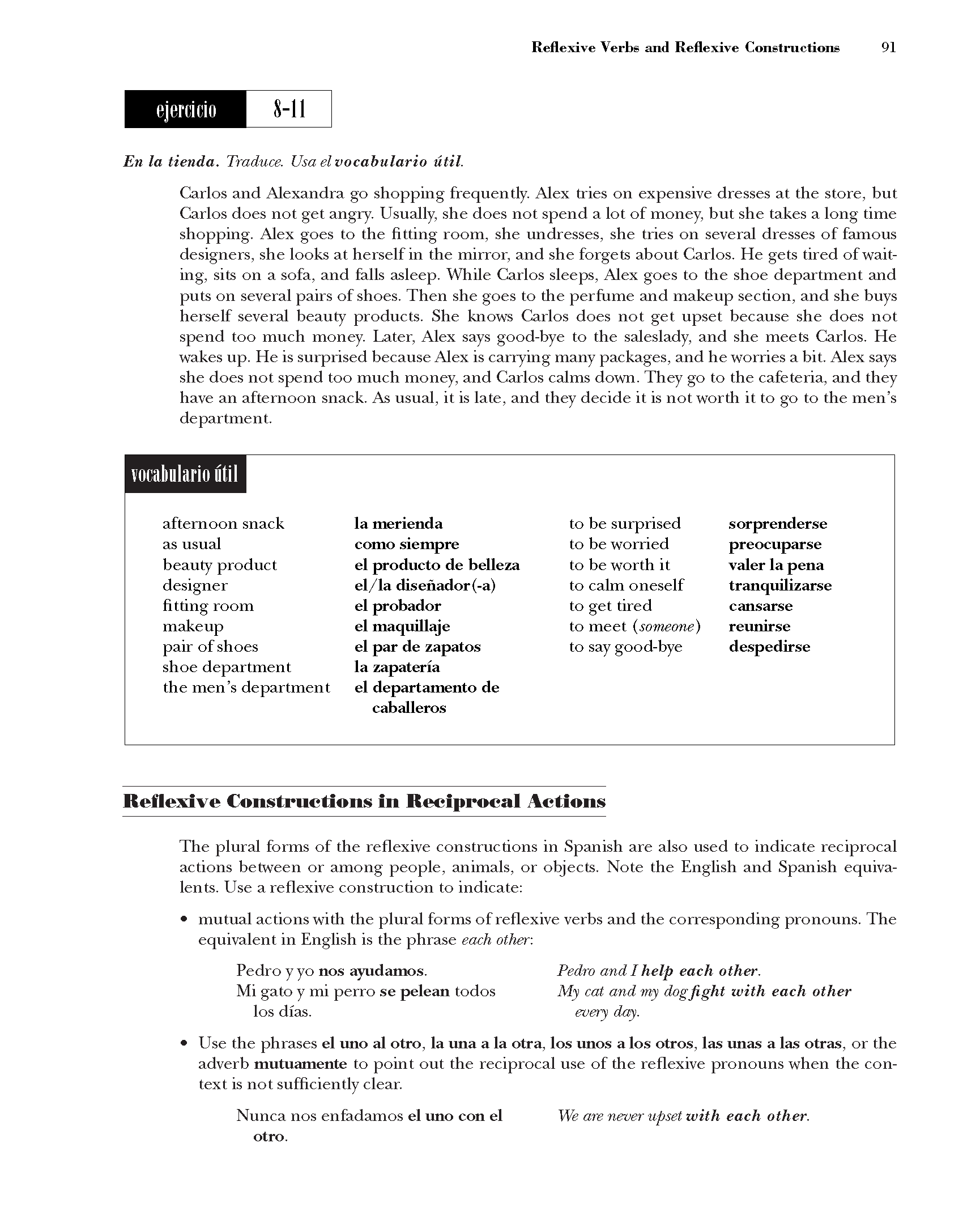CSG102

Reflexive Verbs and Reflexive Constructions
91
8-11
ejercicio
En la tienda. Traduce. Usa el vocabulario util.
Carlos and Alexandra go shopping frequently. Alex tries on expensive dresses at the storę, but Carlos does not get angry. Usually, she does not spend a lot of money, but she takes a long time shopping. Alex goes to the fitting room, she undresses, she tries on several dresses of famous designers, she looks at herself in the mirror, and she forgets about Carlos. He gets tired of wait-ing, sits on a sofa, and falls asleep. While Carlos sleeps, Alex goes to the shoe department and puts on several pairs of shoes. Then she goes to the perfume and makeup section, and she buys herself several beauty products. She knows Carlos does not get upset because she does not spend too much money. Later, Alex says good-bye to the saleslady, and she meets Carlos. He wakes up. He is surprised because Alex is carrying many packages, and he worries a bit. Alex says she does not spend too much money, and Carlos calms down. They go to the cafeteria, and they have an afternoon snack. As usual, it is late, and they decide it is not worth it to go to the men’s department.

|
afternoon snack |
la merienda |
to be surprised |
sorprenderse |
|
as usual |
como siempre |
to be worried |
preocuparse |
|
beauty product |
el producto de belleza |
to be worth it |
valer la pena |
|
designer |
el/la diseńador(-a) |
to calm oneself |
tranquilizarse |
|
fitting room |
el probador |
to get tired |
cansarse |
|
makeup |
el maquillaje |
to meet (someone) |
reunirse |
|
pair of shoes |
el par de zapatos |
to say good-bye |
despedirse |
|
shoe department |
la zapateria | ||
|
the men’s department |
el departamento de | ||
|
caballeros |
Reflexive Construetions in Reeiprocal Actions
The plural forms of the reflexive constructions in Spanish are also used to indicate reeiprocal actions between or among people, animals, or objeets. Notę the English and Spanish equiva-lents. Use a reflexive construction to indicate:
• mutual actions with the plural forms of reflexive verbs and the corresponding pronouns. The equivalent in English is the phrase each other:
Pedro y yo nos ayudamos. Fedro and Ihelp each other.
Mi gato y mi perro se pelean todos My cat and my dogfight with each other
los dias. euery day.
• Use the phrases el uno al otro, la una a la otrą, los unos a los otros, las unas a las otras, or the adverb mutuamente to point out the reeiprocal use of the reflexive pronouns when the con-text is not sufficiently elear.
Nunca nos enfadamos el uno eon el We are never upset with each other.
otro.
Wyszukiwarka
Podobne podstrony:
CSG076 Morę Ab out the Preterit and the Imperfect 65 4. 5. 6. 1. 6-9ejercicio La boda. Traduce. Usa
CSG076 Morę Ab out the Preterit and the Imperfect 65 4. 5. 6. 1. 6-9ejercicio La boda. Traduce. Usa
CSG076 Morę Ab out the Preterit and the Imperfect 65 4. 5. 6. 1. 6-9ejercicio La boda. Traduce. Usa
CSG092 Unit 8Reflexive ferbs and Reflexive Constructions Reflexive verbs are used in reflexive const
CSG104 93 Reflexive Verbs and Reflexive Constructions • Use hacerse + noun or adjective to express t
CSG094 83 Reflexive Verbs and Reflexive Constructions 2. 3. 4. 5. 6. 1. Voy al bano y_en el
CSG096 Reflexive Verbs and Reflexive Constructions 85The Tse of Reflexive Terbs in Spanish Reflexive
CSG098 87 Reflexive Verbs and Reflexive Constructions Basic meaning Reflexive
więcej podobnych podstron